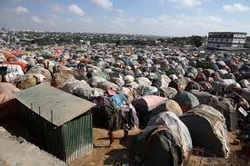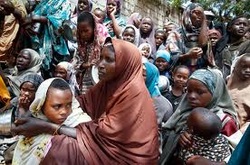
The human rights group says the process has led to large-scale human rights abuses. Some 370,000 people have been living in the camps, having fled drought, famine and fighting.
Badbaado, the refugee camp located outside of Mogadishu, Somalia, formed as a result of the 2011 East Africa drought and famine, and houses roughly 30,000 refugees.
Food aid is available for refugees there, but its supply has been tenuous due to the policies of al-Shabab. The limited access to food has been a source of violence in the camp, and there has also been looting by freelance militias and government forces. Due to the unsafe conditions, some refugees have fled Badbaado to seek other camps.
Now, the makeshift camps and tent cities in Mogadishu are hampering the government's drive to relocate hundreds of thousands of displaced people to camps on the outskirts so they can rebuild the city.
The Amnesty report says the relocation plan could have been a positive development if it had respected the security, fundamental rights and basic needs of displaced people.
However, the government plan proved to be inherently flawed and seems to have resulted in large-scale human rights abuses and forced evictions.

Some residents told Amnesty bulldozers had flattened their shelters, destroying their possessions and leaving them with nowhere to go.
On 21 August, Amnesty delegates visited the area. They saw evidence of a large number of shelters having been recently destroyed.
This world is so unequal. The place where we are born decides how our life will be mapped out. Even if motivational leaders lectured these displaced refugees, the audience faces little hope of achieving greatness. I guess, they can strive for their potential—be the best they can be, love their neighbor and tread the path their birth set them on to the end. If only we who have plenty in comparison could share what we had. I can't see any way of helping these people.

 RSS Feed
RSS Feed






